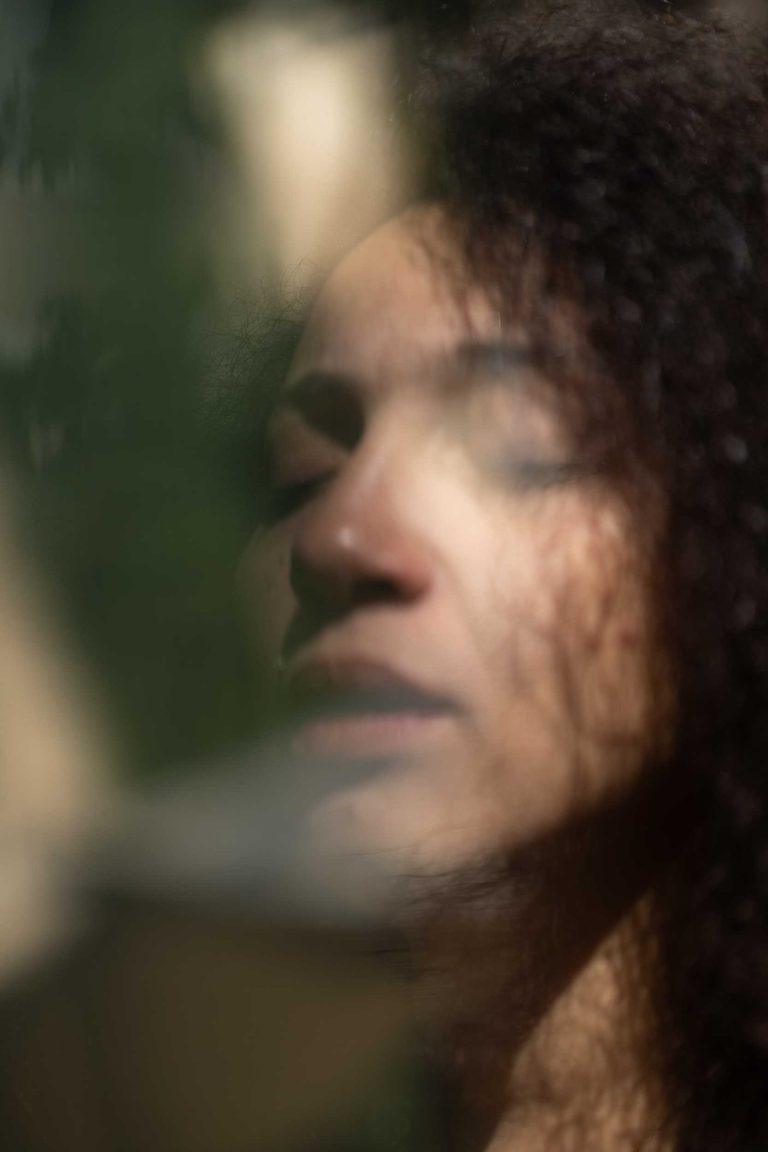After an eight-year hiatus since Maryam Saleh’s last full-length project, she unveils her first secret ‘El Fetra’ (translated as “The Instinct”) from her upcoming album ‘Syrr’, scheduled for release next year. The track features a sophisticated blend of heritage-rooted composition and avant-garde electronic production.
Unlike her protest songs, directed outward toward society, ‘El Fetra’ feels like an internal monologue, blending raw lyrical expression with subtle theatricality. Saleh crafts an immersive sonic autobiography rooted in embodiment in a very deep vocal performance. Saleh’s vocals mimic an instrumental rhythm themselves, weaving in and out of Zizi Ibrahim’s sweltering cello lines. There is a call-and-response quality between her phrases and the instrumental hooks, echoing the taqtuqa song form she references.
Right off the bat, you can spot El Waili’s fingerprints from the pitch-corrected vocal treatment with haunted undertones and distorted autotuned textures. Blending with Saleh’s vocal presence that shifted from her previous biting satire in her Halawella era and the rock-inspired harsh ferocity of her Sheikh Imam repertoire. Here, she leans into something softer, ethereal in spectral vocals influenced by maqam and tawashish, moving between notes in a breathy and intimate delivery.
The single transforms memory, loss, and lived experience into a shifting world of sound, voice, and embodied emotions as Saleh describes it: “Writing, for me, is a search for a private pulse that can hold feeling before it dissolves into noise. Loss began as the first crack, then became a current of energy, and finally an echo running between the words, balancing what is spontaneous with what is deliberately remade. Three years of listening, returning, revising; breaking open the text and re-forming it until it revealed itself more clearly.” – Maryam Saleh
The production operates as a collaborative tour-de-force between Maryam Saleh, experimental composer Maurice Louca, and psychidelic shaabi producer El Waili, with Palestinian electroacoustic oud player Kamilya Jubran contributing additional production influence across the broader project. Their combined approach bridges the organic timbres of traditional acoustic instrumentation with the colder, textural edges of contemporary electronic music. Louca’s keys, Jubran’s oud and backing vocals, Ibrahim’s expressive cello, and El Waili’s grainy electronic textures, all together create a style that reimagines the 20th-century neo-taqtuqa form without relying on a traditional takht ensemble, just giving it that hint of nostalgia. The track was mastered by acclaimed engineer Heba Kadry, known for her work with experimental artists such as Björk and Slowdive.
Recorded live at CairoGroove 2025, the single builds on strophic verses and repeating refrains, written and composed by Saleh as a meditation on instinct and intuition. The song bridges traditional melodic structures with modern production approaches. Released via Simsara Records, the single precedes the upcoming album, a work written and composed over three years, with Jubran as a close mentor throughout the process. The album traces a journey in which the self is fractured, questioned, reassembled, and expanded, blending shaabi and folk sensibilities with innovative production and Saleh’s unique approach.
Born and raised in Cairo, Saleh grew up surrounded by art and music. Her father, Saleh Saad, a playwright and director, brought her into his street theatre troupe at age nine, while her mother, a singer, immersed her in the full spectrum of Arab musical heritage. Frequent gatherings often featuring Sheikh Imam and Ahmed Fouad Negm shaped her artistic instincts, which inspired her to become the teenage frontwoman of Gawaz Safar in the early 2000s, reviving the protest songs of Sheikh Imam for a new generation where she took off and released her debut album ‘Mesh Baghanny’, followed by the groundbreaking electro-satirical force of ‘Halawella’ (2015) with Zeid Hamdan.
WE ALSO SAID: Don’t Miss…Hady Moamer Taps Into Melancholia on His Double-Single EP ‘Lama Tgheb El Shams’



